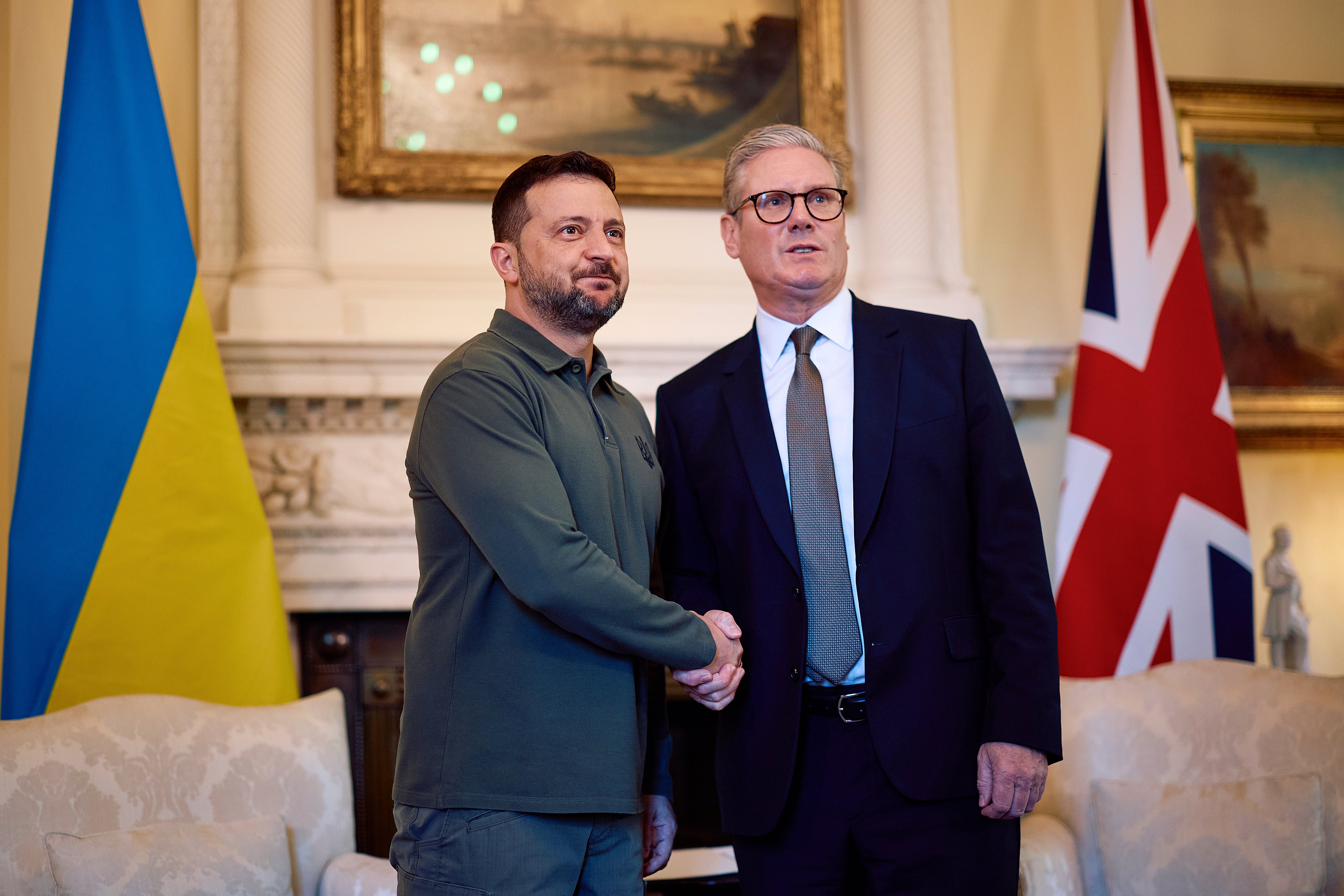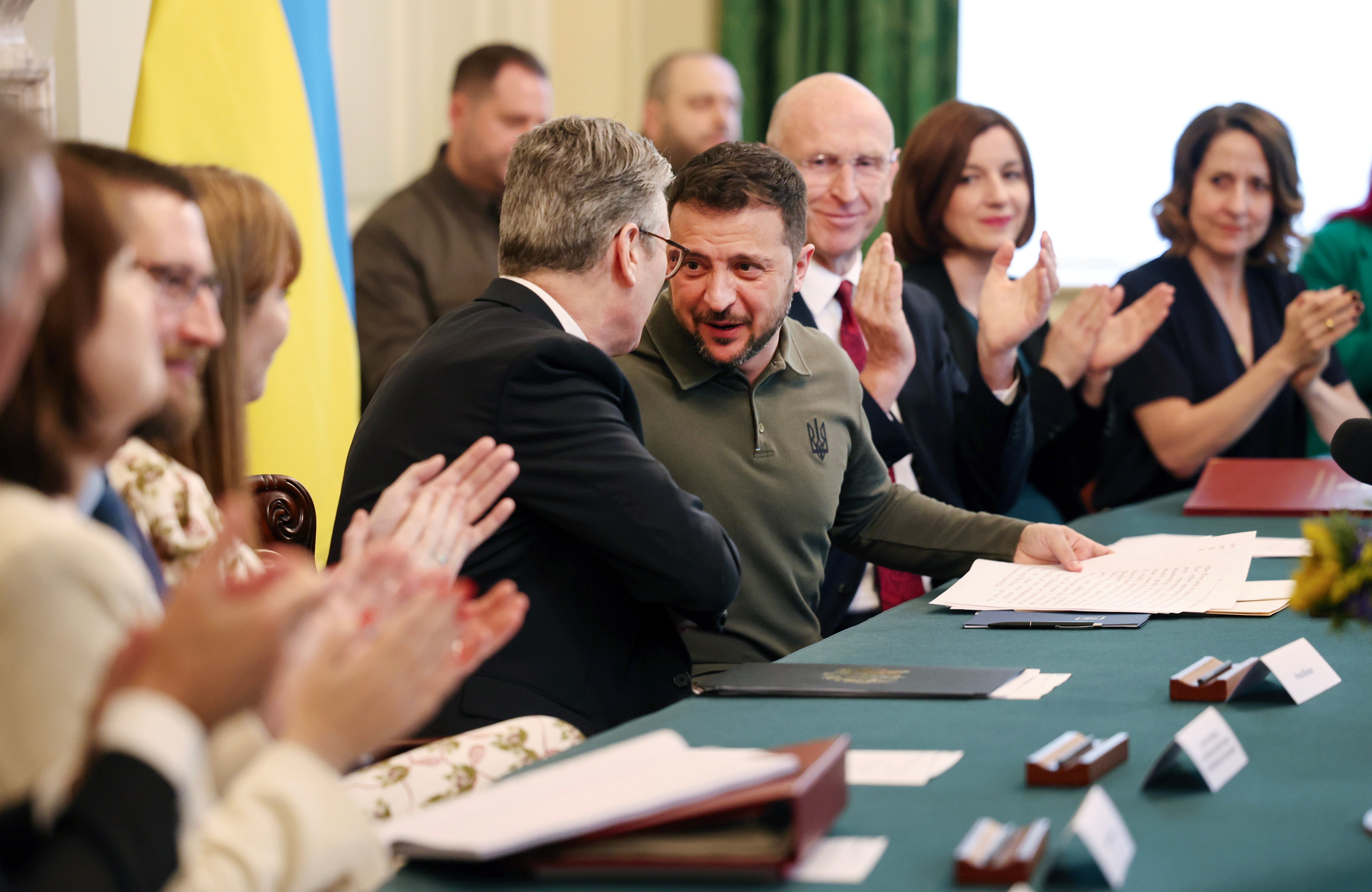Starmer’s words will be welcomed in Kyiv – but Zelensky needs action more than ever
The PM is keen to maintain Britain’s position as one of the world’s most vocal supporters of Ukraine – a role that will become even more important as backing from other powers begins to waver, writes Mary Dejevsky


The red carpet was laid, the prime minister was at the famous black door, and the special guest made his entrance. To a standing ovation from the new UK cabinet, Volodymyr Zelensky called on Keir Starmer, the fourth British prime minister he’s met since the war began, to “show leadership” and help with the removal of restrictions on weapons supplied by Western allies.
The PM, who vowed to “double down” on support for Ukraine, described the meeting as “a real piece of history”. Zelensky, who has exchanged similar warm words with various Western leaders, may not agree that Friday’s meeting was quite so historic, but the significance of the event itself must not be overlooked. The president of Ukraine had been invited to address a meeting of the UK cabinet – only the second foreign dignitary to be afforded this honour in recent memory.
That the first was US president Bill Clinton, just weeks after Tony Blair won his landslide election victory in 1997, is not insignificant. The invitation not just to a bilateral meeting at No 10, but to address the cabinet, is unusual, and is seen as evidence of the particular importance of a special relationship.
For Blair, it was important to convey a message of continuity in Britain’s links with the United States, and it set in train a relationship that became close – not just in standard geopolitical terms, but personally and ideologically – between New Labour as personified by Blair and the Clinton-Gore team at the White House.
Something of the same imperative can be discerned in the invitation issued by Starmer to Zelensky. In being the first foreign leader to express public support for Ukraine after the Russian invasion in February 2022, and by dashing to Kyiv at a time when security was – to put it mildly – in question, Boris Johnson became the standard-bearer of European support for Ukraine. He also established a genuine personal rapport with Zelensky, which set the tone for Britain’s solidarity with Ukraine and has been hard for subsequent British prime ministers to replicate.
This rare invitation can thus be seen as an attempt by the latest prime minister of the UK to reassure Ukraine of this country’s continuing support, and to rekindle something of the trust that surely existed between Johnson and Zelensky. The balance of advantage from this meeting, however, undoubtedly rests with Starmer.
It showed the new prime minister as comprehensively in charge, a leader not only on the national but on the international stage, and welcoming the individual who remains the embodiment of personal courage across most of the Western world. In Ukraine – or internationally – it is doubtful whether more footage of Zelensky meeting a foreign leader and addressing a table full of admiring ministers, however impressive and historic the backdrop, will do a great deal to boost the Ukrainian president’s fraying authority in Kyiv. Neither will it do much to reverse what has become something akin to “Ukraine fatigue” in countries such as the US and Germany, which have been among the biggest supporters of Ukraine in both material and moral terms until now.

It has also to be said that the magic of Zelensky’s personal appeal, with his virtual and then real-life appearances all over the world, has long since begun to wear off. What began as a PR campaign of genius, thanks chiefly to Zelensky’s own gift for communication, and a model of how a country at war could present its case courtesy of modern media, has lost much of its effectiveness – in part, perhaps, as a consequence of overuse. That could already be seen when Zelensky gave his virtual address to the UK parliament, laden with Churchillian allusions, almost a year after the Russian invasion. Some of those present subsequently vouchsafed a degree of unease about the adulatory atmosphere, which they felt carried risks of its own.
While Zelensky is, by now, well accustomed to trips to meet his foreign counterparts, Starmer has been almost uniquely fortunate as prime minister in his opportunities for an early introduction to “abroad”. Within days of the election, he travelled to Washington for Nato’s 75th anniversary summit, which included the coveted one-on-one meeting with the US president in the Oval Office. Barely a week later, Starmer hosted the European Political Community gathering in the august surroundings of Blenheim Palace, attended by more than 40 European leaders, which was followed by a private dinner with the French president. Few national leaders can have enjoyed such a concentrated and high-level debut as Starmer, largely thanks to the election timing.
One trip Starmer did not make, however, was to Kyiv. Starmer’s two predecessors followed in Boris Johnson’s footsteps by making the journey to Ukraine within days of taking office. Starmer sent his defence secretary, John Healey, to assure Zelensky of the UK’s continued support, and has vowed to visit himself in the future. The foreign secretary, David Lammy, meanwhile went to Germany, Poland and Sweden – interesting choices in the light of the government’s apparent desire for a security treaty with the EU.
Perhaps the cabinet address can be seen as something of a consolation prize for Zelensky, given that Starmer chose to tour UK capitals, rather than travel to Kyiv, in his first 48 hours – a significant (and undoubtedly correct) choice, by the way.
However distinguished the setting, and however warm the words on either side, there was inevitably more appearance than substance to the proceedings. And nothing that will bind the hands of Starmer and his government, should the wider imperatives of Britain’s Ukraine policy, for whatever reason, change – say, as a result of the US election.



Join our commenting forum
Join thought-provoking conversations, follow other Independent readers and see their replies
3Comments